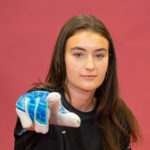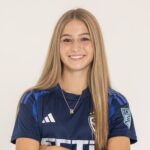ECNL Finals recruiting: Iowa coach Nick Flohre talks recruiting, style of play
By Quinn Casteel
Richmond, Va. – With 70 total teams competing from every corner of the U.S., the ECNL Finals offer an endless spectrum of physical and mental approaches to the game of soccer. For University of Iowa assistant coach Nick Flohre, this is among the most intriguing aspects of recruiting at the event, where he can compare and contrast the different styles of play while watching one the most competitive girls club soccer events of the year.
“We’re centered in the Midwest, that’s where the majority of our kids come from but we do have kids from other regions of the country,” Flohre said. “This tournament allows us to see those Midwest kids against other regions, and the other styles of play from other places so it’s a benefit in both ways.”
“It lets us check out players from the East Coast or the West Coast or the South, but we also get to see those Midwestern kids against those players,” he continued.
With eight fields running games throughout the day from ages U14-U23, college coaches have a potentially overwhelming number of options for recruiting strategies at the ECNL Finals. Coming off a 12-6-3 finish last season, Iowa will be one Big Ten team looking to make a bigger splash in the recruiting game this summer.
“Sometimes we just watch the overall best players, and other times we watch positions we’re looking for,” Flohre said. “You can see anything you want to see here because the level is so high, and they’re playing for something on the line. You see the competitiveness and the tenacity that you don’t see at showcase tournaments.”
NCAA recruiting regulations prevent coaches’ access to talking to players at the ECNL Finals in most cases. Even though there are coaches from every major conference and several mid majors as well, there is little communication between recruiters and players at the tournament itself.
For Flohre and fellow Iowa assistant coach Julie Hanley, watching the players from afar in a natural, non-traditional showcase environment can be more beneficial. This is because a team-oriented structure is generally much more revealing than a setting where players are performing for their own personal reasons.
“That’s definitely the benefit of this league,” Flohre said of the team environment emphasized by ECNL.
One growing challenge in the college recruiting world is the continually younger age at which the process begins.
“We’re watching the U15s, U16s are well on their way and a lot of U17s are done [picking schools],” Flohre said. “I don’t know who’s fault it is, if it is a fault, but the recruiting process has sped up a lot.”
Comradery among college coaches is a big aspect of the recruiting side of the ECNL Finals. With little to no interaction going on with the players, the coaches spend a lot of time with each other watching games and convening at the coaches’ tent.
“It’s a pretty friendly environment, the soccer world is very small whether it’s college coaches or club coaches from all over the country,” Flohre said. “People are very friendly with each other even though we compete against each other and we’re all here for the same reason.”
The 2013 ECNL Finals run from July 11-15, with most games being played at the West Creek Fields in Richmond, Va. Friday’s games have been moved to the turf fields at River City Sportsplex in Midlothian, Va. due to wet conditions on the grass at West Creek. Following an off-day on Saturday, the action will return to West Creek Sunday morning.











